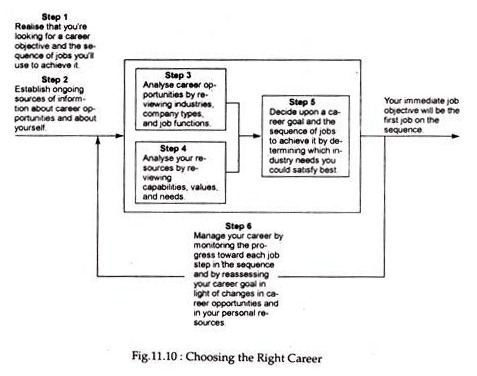This article throws light upon the top five career anchor groups in an organisation. The groups are: 1. Technical/Functional Competence 2. Management Competence 3. Creativity 4. Security or Stability 5. Autonomy.
Career Anchor Group # 1. Technical/Functional Competence:
The entire career is organised around particular sets of technical and functional skills (possessed by the person) and values, leading to a self-concept of remaining in an occupation that would continue to provide challenging work around those particular skills. Alumni in this group were in various jobs ranging from the roles of technical staff to those of functional management.
Career Anchor Group # 2. Management Competence:
The entire career is organised around climbing an organisational ladder to achieve a position of responsibility in general (as opposed to functional) management in which decisions and their consequence could be clearly related by the individual to his own efforts in analyzing problems, dealing with people and making complex (or difficult) decision under highly uncertain environments.
Alumni in this group were clearly striving to acquire general management positions, such as president or executive vice-president.
Career Anchor Group # 3. Creativity:
The entire career is organised around some sort of entrepreneurs effort that would allow the individual to develop a new product (service) or a process (i.e., method of production), to invent something, or to build his own business. Some alumni in this group already had succeeded in business ventures while others were still struggling and carrying out search exercises.
Career Anchor Group # 4. Security or Stability:
The entire career is organised around the location of an organisational niche that would ensure continued employment, a stable future and the ability to maintain the current family standard through achieving a measure of financial independence.
Career Anchor Group # 5. Autonomy:
The entire career is organised around searching out an occupation such as teaching, counselling, running a store, or something equivalent that allows the individual to determine his (her) own hours, life-style and working patterns.
This group of people was most likely to drop out of conventional business organisations, though their consulting or teaching activities continued to be related, directly, to business and management.
The second situation is helping manage the careers of his (her) subordinates. However, these two situations are different but interrelated in the sense that one’s career is enhanced to the extent that one’s subordinates perform better during their own careers.
Career management refers to the personal and organisational process of managing (especially planning) one’s career management process. See Fig.11.10.
